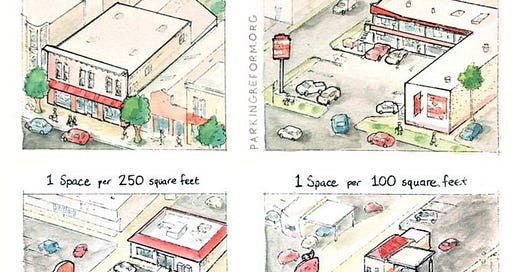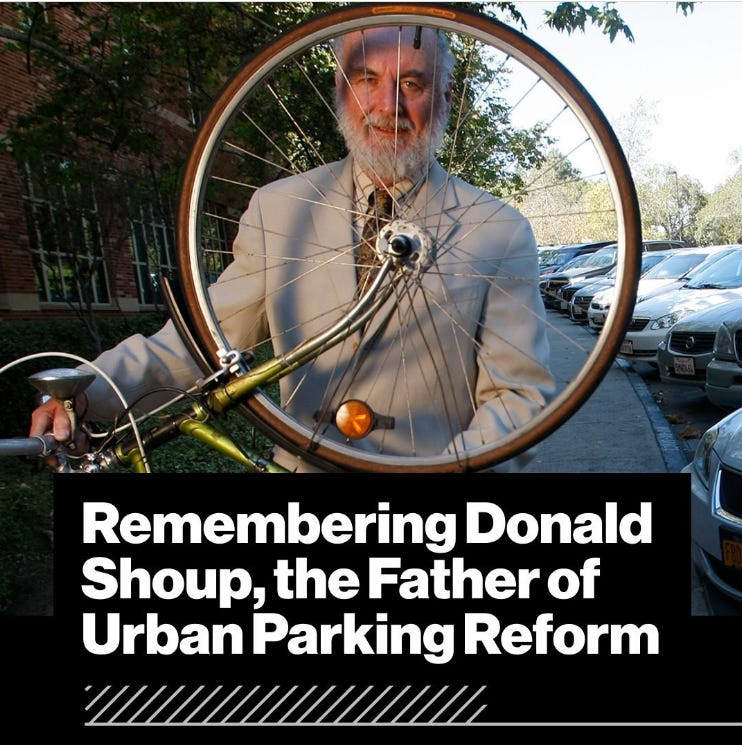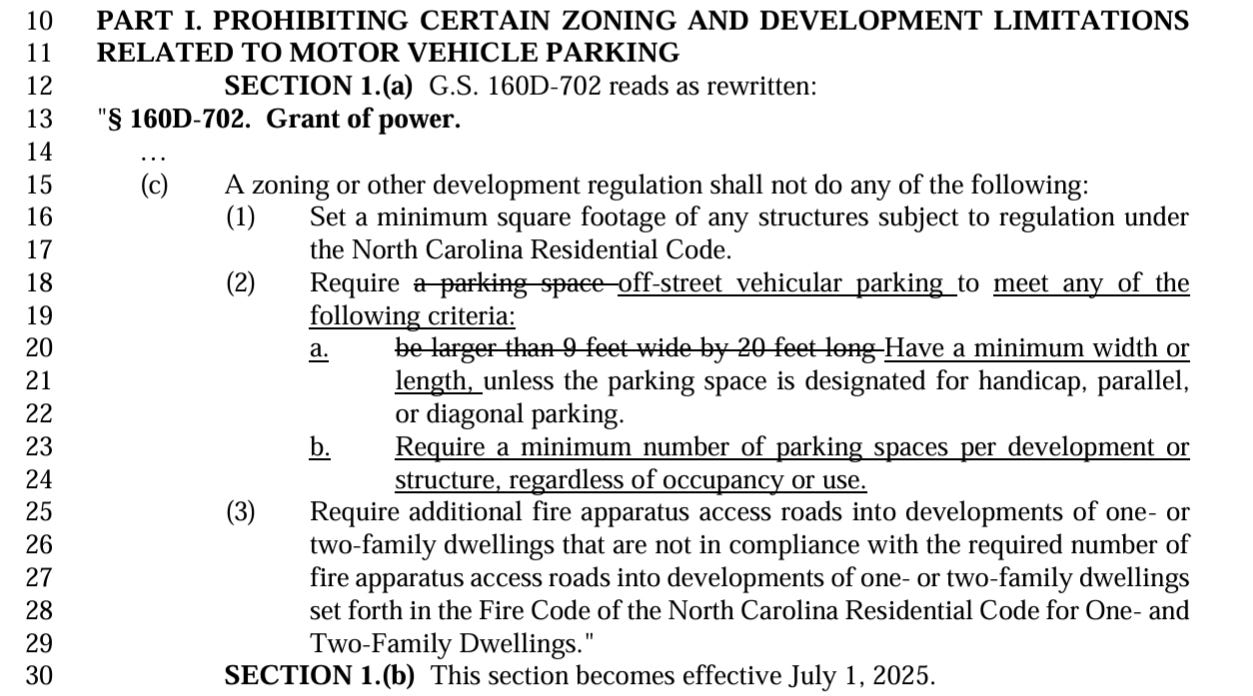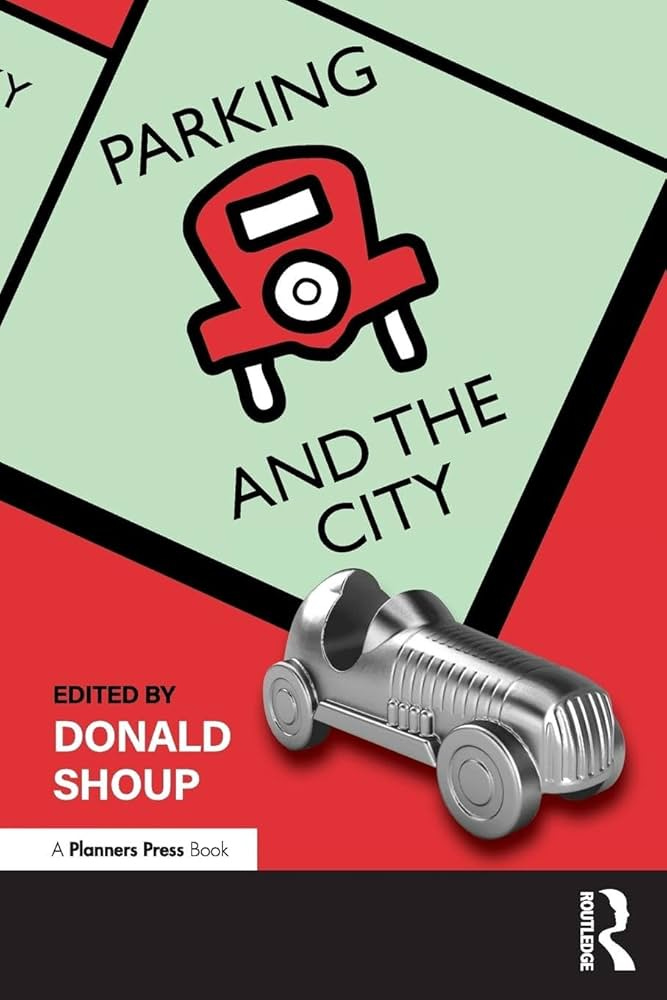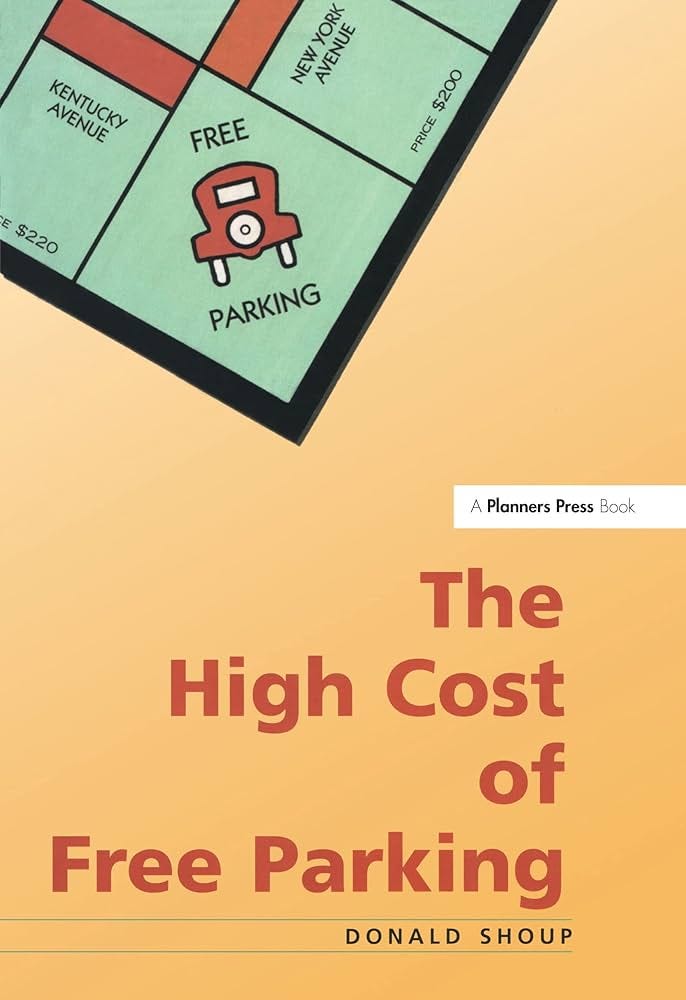The End Days of Parking Requirements
At least five states, including North Carolina, are taking kill shots in 2025
Imagine if the government forced every new apartment to include a free horse stall. Or boat stall. Or made restaurants build extra root cellars that no one actually wanted or needed. Sounds absurd, right? But that’s exactly what cities have been doing for decades with mandatory parking requirements.
But there is good news on the horizon. After parking requirements dictating American land development forms for more than half a century, there are now rumblings in state legislatures across the country that this is all coming to an end—and it’s primarily due to the leadership of a wonky UCLA planning professor, who passed away last month.
SHOUP (THERE IT IS)
Donald Shoup, the world’s leading parking reformer, spent 40 years exposing this basic scam: cities require developers to overbuild parking, subsidizing car ownership at the expense of everything else—housing, walkability, small businesses, the environment. The town claims victory by seeming to get something for nothing just by demanding compliance with these extremely technical and specific codified standards.
But Shoup proved that there’s no science behind it. Zero.
Shoup proved the numbers were made up—pseudoscience cloaked in credentialism and code.
…Planners are winging it. Planners are not oracles who can divine the demand for parking. I have never met a city planner who could explain why any parking requirement should not be higher or lower. To set parking requirements, planners usually take instructions from elected officials, copy other cities’ parking requirements, or rely on unreliable surveys. Parking requirements are closer to sorcery than to science.
Dr. Donald Shoup, The Pseudoscience of Parking Requirements
The absurdity of these standards has only grown with time. Do planners really carry with them sage knowledge that each bar needs three parking spaces per pool table? Or 3.3 parking spaces per 1000 sf of retail sex shop? (These are actual codes written by actual professionals in North Carolina.)
North Carolina now has a chance to break free. HB369 would eliminate parking mandates statewide—potentially making NC the national leader in parking reform and legislative sanity. It’s a huge deal, and I explain why below.
The High Cost of “Free” Parking
Shoup, who passed away on February 6th, laid it out bluntly: mandatory parking requirements make everything worse.
When planners codify parking requirements, “they do not know how parking requirements increase the price of everything except parking; how parking requirements affect architecture and urban design; how parking requirements affect travel choices and traffic congestion; how parking requirements affect air pollution, fuel consumption, and CO2 emissions.”
But we do know that the negative externalities of parking requirements mean that:
Housing Costs More – Every “free” parking space isn’t free at all—it just gets baked into higher rents and home prices. You might not even own a car, but guess what? You’re still paying for a parking space.
Businesses Suffer – Want to open a café in an old storefront? Too bad. The zoning code demands 20 parking spaces you can’t possibly fit. Parking minimums kill local businesses before they even get started.
Cities Sprawl Out – All those extra parking lots? They push buildings farther apart, making it impossible to walk anywhere. The result: more traffic, longer commutes, and cities that feel like giant strip malls.
Environmental Costs are Inevitable – Subsidizing car storage means subsidizing car use. And more driving = more emissions. (HB369’s major sponsor is Cawawba Riverkeeper, an environmentalist group aware of parking requirements’ devastating effect on runoff.)
Shoup compares parking mandates to dark energy—a hidden force that “spreads cities out and rips them apart.” But the truth is, the bigger problem is procedural; parking mandates are just bad policies dressed up as common sense.
Too few in the planning profession are taking responsibility.
While cities like Raleigh and Durham have led by removing minimum parking requirements entirely, they remain on the books in nearly all municipalities. Planning consultants continue to pedal them into new codes every day.
Something must be done. An outside force appears to be needed.
HB369: The Statewide Fix
Here’s where North Carolina has a chance to get it right. HB369, The Parking Lot Reform and Modernization Act, was filed on March 11th, 2025, and would eliminate parking mandates statewide.
HB369 would prohibit “a zoning or other development regulation” from “requr[ing] a minimum number of parking spaces per development or structure, regardless of occupancy or use.”
It’s that simple. What does it mean for citizens, retailers, politicians, and small practitioners?
It would let people—not zoning codes—decide how much parking they need. And it would end the practice of the one-size-fits-all nonsense that wastes inordinate amounts of planner and applicant time.
IT’S STILL A CHOICE
Critically, HB369 is not a ban on parking. It’s a ban on forced parking. The distinction is critical (and many will miss it, and many more will deliberately mislead people about it). If developers think their projects need space, they can still build them. But they won’t be forced to pave over half a city block just because a Model Cities zoning code from 1969 says so.
And the benefits? Massive. Cheaper housing results from lower construction costs. More walkable, vibrant cities result from less dead space, with more actual places worth going. Better small business growth occurs because your local coffee shop shouldn’t have to provide a stadium’s worth of parking.
Will HB369 Pass?
The time has come for America to take its kill shot at parking requirements. And legislatures are raising their crosshairs.
Politically speaking, HB369 is a bipartisan bill and has something for everyone. Shoup notes:
Conservatives will see that it reduces government regulations. Liberals will see that it increases public spending. Environmentalists will see that it reduces energy consumption, air pollution, and carbon emissions. Urban designers will see that it enables people to live at higher density without being overrun by cars…Elected officials will see that it depoliticizes parking, reduces traffic congestion, allows infill development. Finally, planners can devote less time to parking and more time to improving cities.
If this sounds radical, it’s not. Other cities and states have already done it—and the sky didn’t fall. In fact, things got better.
The only real opposition comes from the usual opposers of citizen choice reforms—anti-development factions who oppose all change, particularly if it might result in more housing; planner associations who resent the territorial encroachment; Municipal Leagues who loathe all power shifts from cities to states; and of course, people who think free parking is a birthright.
But the truth is, parking isn’t free—everyone pays for it whether they drive or not. HB369 is about ending this parking Ponzi scheme.
How NC Legislature Will Break the Status Quo Bias
Despite all the harm off-street parking requirements cause, they are almost an established religion in zoning practice. One should not criticize anyone else’s religion, but I’m a protestant when it comes to parking requirements. And I believe zoning needs a reformation.
-Donald Shoup
Shoup once said that parking reform is like opening a combination lock: each little change might achieve nothing, but when everything lines up, the city finally unlocks its potential.
With this bill, North Carolina is on the verge of something big. HB369 isn’t just about parking—it’s about freeing cities from outdated, car-first, car-only planning.
There is certain to be a parade of states seeking to break up with mandatory parking—and more in the years to come. To honor the work of the late Dr. Shoup, North Carolina should grab the baton and lead the way.


